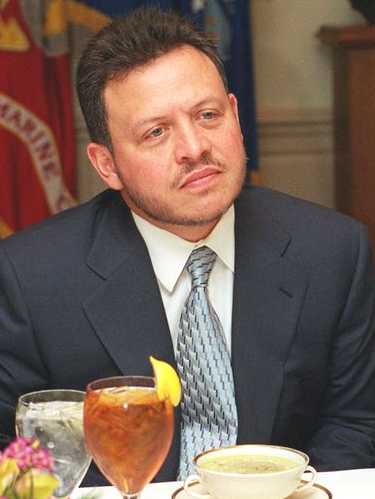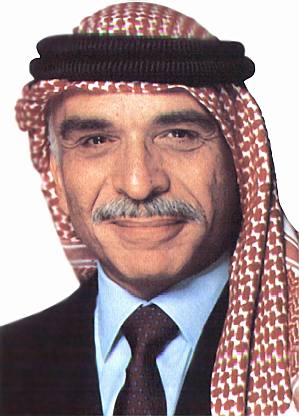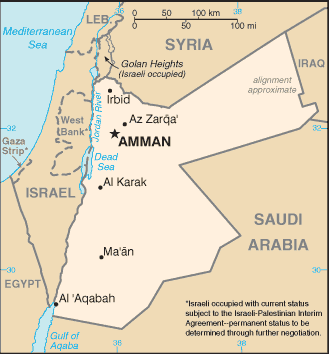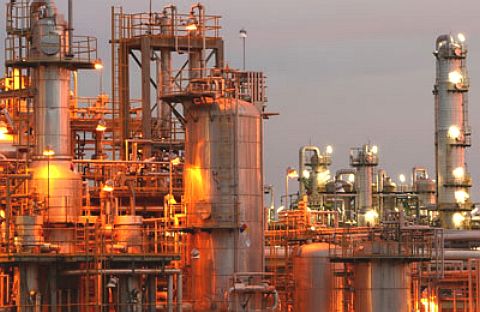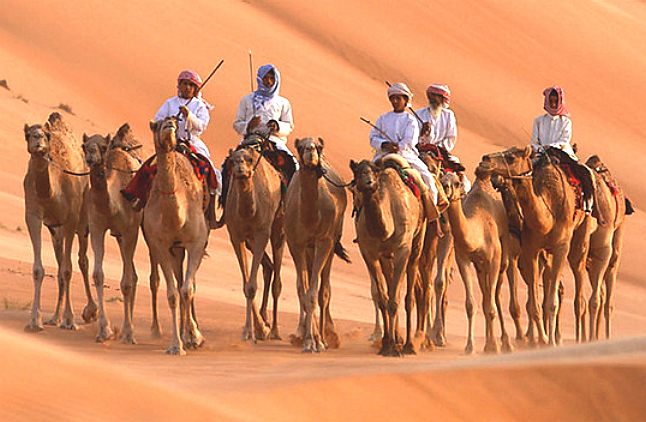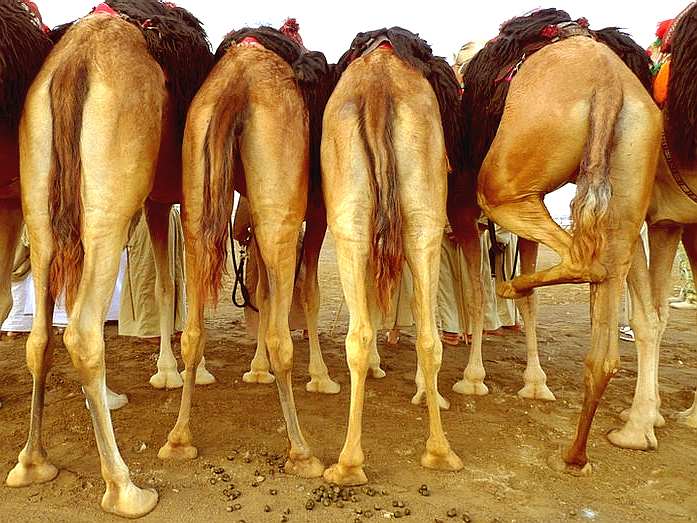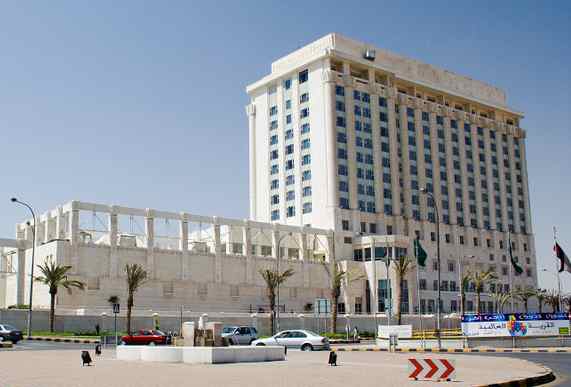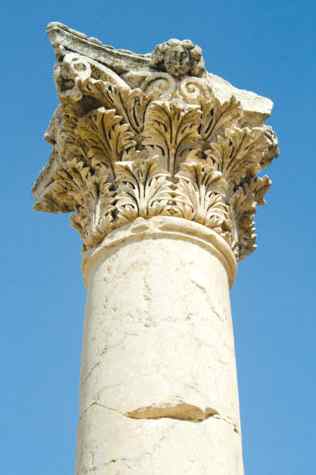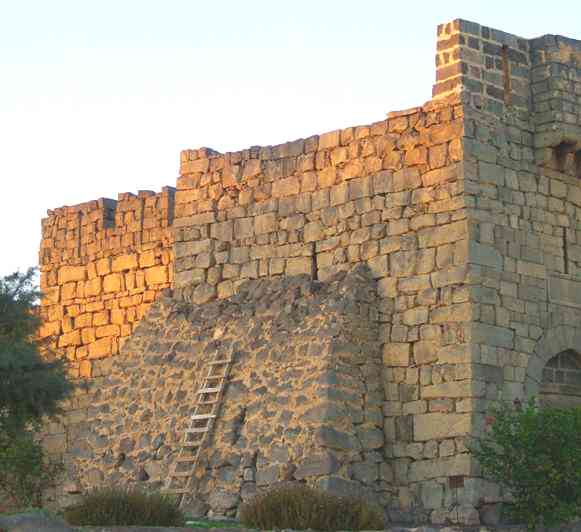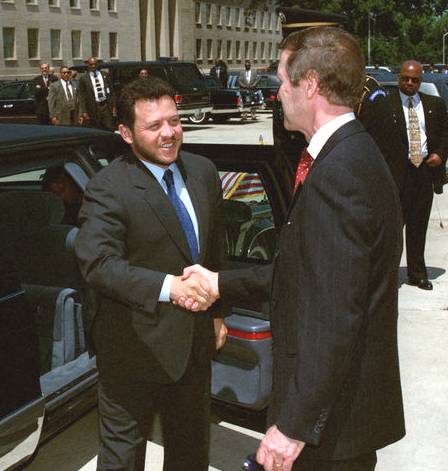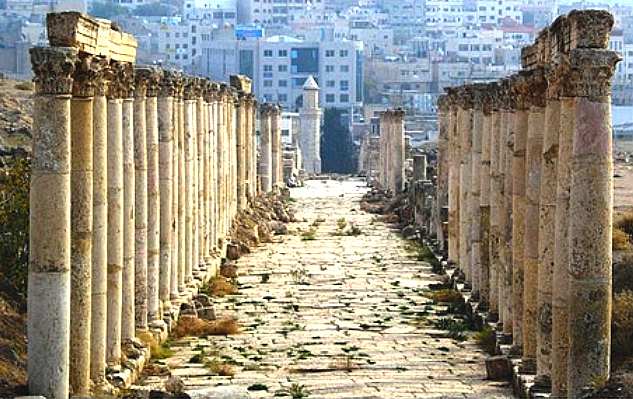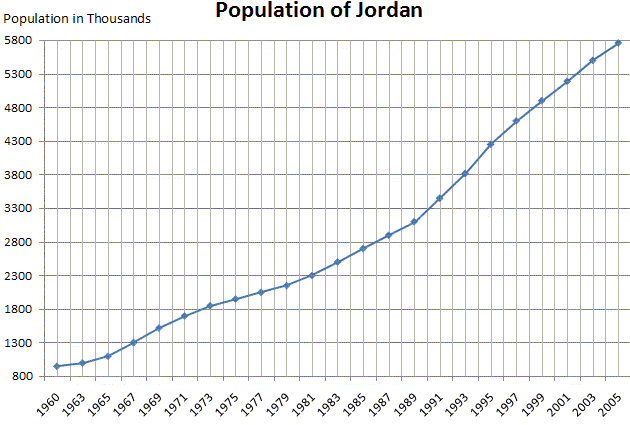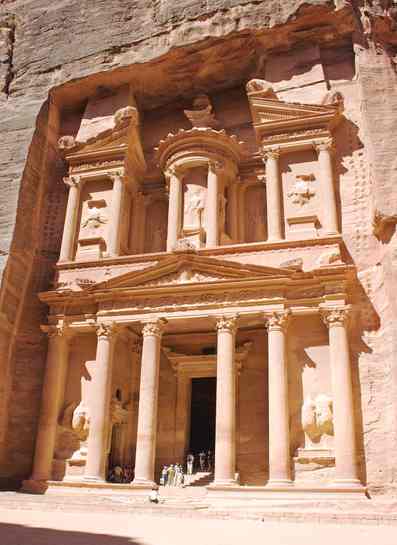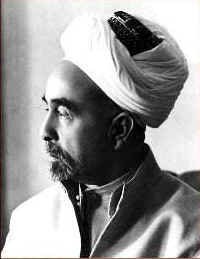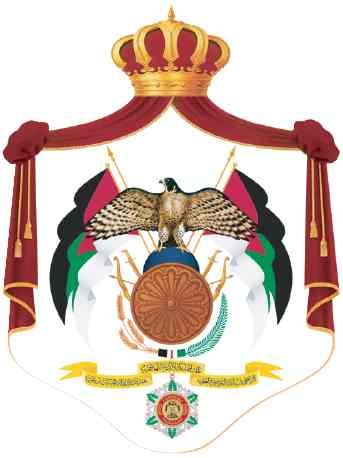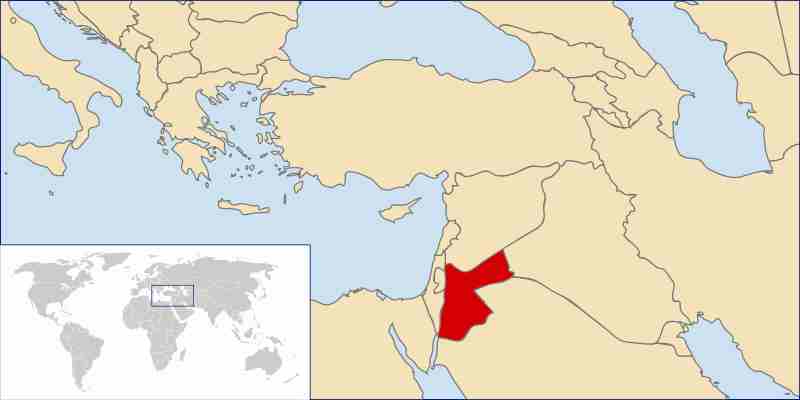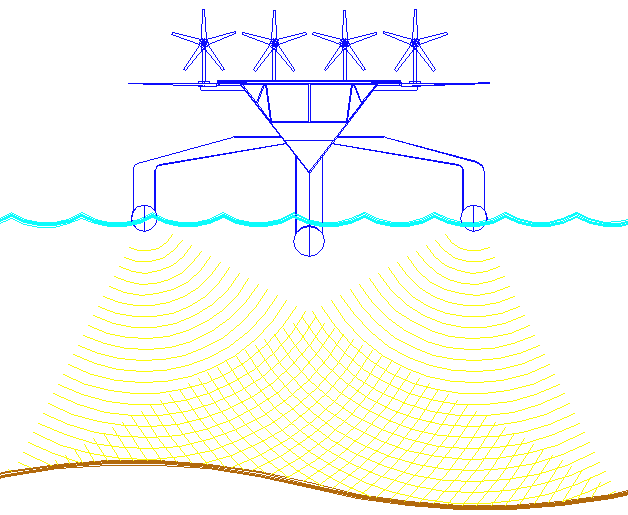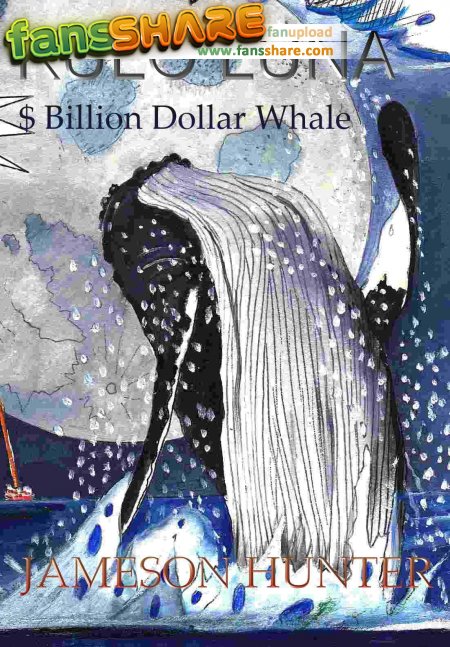Address:
|
JORDAN
|
||||||||||||||||||||||||||||||||||||||||||||||||||||||||||||||||||||||||||||||||||||||||||||||||||||||||||||||||||||||
|
King Abdullah II, Jordanian Head of State
Jordan (Arabic: الأردنّ, transliterated as Al-Urdunn), officially the Hashemite Kingdom of Jordan (Arabic: المملكة الأردنية الهاشمية ), is an Arab country in the Middle East in western Asia. It is bordered by Syria to the north, Iraq to the north-east, Saudi Arabia to the east and south, and Israel to the west. It shares with Israel the coastlines of the Dead Sea, and the Gulf of Aqaba with Israel, Saudi Arabia, and Egypt.
HISTORY
Hashemite Kingdom of Jordan
With the break-up of the Ottoman Empire at the end of World War I, the League of Nations created the French Mandate Syria and British Mandate Palestine. Approximately 80% of the British Mandate of Palestine was east of the Jordan river and was known as "Transjordan". In 1921, the British gave semi-autonomous control of Transjordan to the future Abdullah I of Jordan, from the Hashemite family, who had lost their civil war with the House of Saud for control of Mecca and Medina.
The Hashemites continued to rule Transjordan under British supervision until after World War II. In 1946, the British requested that the United Nations approve an end to British Mandate rule in Transjordan. Following this approval, the Jordanian Parliament proclaimed King Abdullah the first ruler of the Hashemite Kingdom of Jordan. In 1950, Transjordan annexed the West Bank, which had been under its control since the armistice that followed the 1948 Arab-Israeli war. The annexation was recognized only by Great Britain (de facto in the case of East Jerusalem).
Following the formation of the United Arab Republic (UAR) by Egypt and Syria, and the Iraqi Revolution in 1958, Jordanian trade routes and Iraqi oil supply were cut. Consequently, Jordan had to request aid from the United States and the United Kingdom, which prevented escalations between Jordan and the UAR (see Conflict between the United Arab Republic and Jordan).
In 1965, there was an exchange of land between Saudi Arabia and Jordan. Jordan gave up a relatively large area of inland desert in return for a small piece of sea-shore near Aqaba.
Jordan signed a mutual defence pact in May 1967 with Egypt, and it participated in the June 1967 war against Israel along with Syria, Egypt, and Iraq. During the war, Jordan lost the West Bank and East Jerusalem to Israel (the western sector having been under Israeli control). In 1988, Jordan renounced all claims to the West Bank but retained an administrative role pending a final settlement, and its 1994 treaty with Israel allowed for a continuing Jordanian role in Muslim and Christian holy places in Jerusalem.
King Hussein
Refugees and Black September
The 1967 war led to a dramatic increase in the number of Palestinians, especially from the West Bank, living in Jordan. Its Palestinian refugee population — 700,000 in 1966 — grew by another 300,000 from the West Bank. The period following the 1967 war saw an upsurge in the power and importance of Palestinian resistance elements (fedayeen) in Jordan. The heavily armed fedayeen constituted a growing threat to the sovereignty and security of the Hashemite state, and open fighting erupted in June 1970. The battle in which Palestinian fighters from various Palestinian Liberation Organization (PLO) groups were expelled from Jordan is commonly known as Black September.
Other Arab governments attempted to work out a peaceful solution, but by September, continuing fedayeen actions in Jordan — including the destruction of three international airliners hijacked by the Popular Front for the Liberation of Palestine and held in the desert east of Amman — prompted the government to take action to regain control over its territory and population. In the ensuing heavy fighting, a Syrian tank force invaded northern Jordan to support the fedayeen but subsequently retreated. It is said by some people, such as Ahmad Jubreel, that King Hussein asked for help from Israel, then Israel threatened that it would invade Jordan if Syria intervened. By 22 September, Arab foreign ministers meeting at Cairo had arranged a cease-fire beginning the following day. Sporadic violence continued, however, until Jordanian forces led by Habis Al-Majali and with the help of the Iraqi forces (who had bases in Jordan after the war of 1967) won a decisive victory over the fedayeen in July 1971, expelling them from the country.
At the Rabat summit conference in 1974, Jordan agreed, along with the rest of the Arab League, that the PLO was the "sole legitimate representative of the Palestinian people", thereby relinquishing to that organization its role as representative of the West Bank Palestinians.
Post Black September and Peace Treaty
No fighting occurred along the 1967 Jordan River cease-fire line during the October 1973 Arab-Israeli war, but Jordan sent a brigade to Syria to fight Israeli units on Syrian territory. Jordan did not participate in the Gulf War of 1990–91. In 1991, Jordan agreed, along with Syria, Lebanon, and Palestinian fedayeen representatives, to participate in direct peace negotiations with Israel at the Madrid Conference, sponsored by the U.S. and Russia. It negotiated an end to hostilities with Israel and signed a declaration to that effect on July 25, 1994 (see Washington Declaration). As a result, an Israeli-Jordanian peace treaty was concluded on October 26, 1994. Following the outbreak of Israel-Palestinian Authority fighting in September 2000, the Jordanian government offered its good offices to both parties. Jordan has since sought to remain at peace with all of its neighbors.
Bombing events
On November 9, 2005, Jordan experienced three simultaneous bombings at hotels in Amman. At least 57 people died and 115 were wounded. "Al-Qaeda in Iraq", a group led by terrorist Abu Musab al-Zarqawi, a native Jordanian, claimed responsibility.
On September 4, 2006, a 38-year-old known criminal, took a pistol to a Roman amphitheatre in the capital of Amman and proceeded to shoot at a group of Western tourists. One British man was killed and five others tourists wounded, including a Jordanian tourist security guard. Later, in December of the same year, he was sentenced to death by hanging.
Map of Jordan
ENERGY HOPES 2020Jordan hopes that by developing gas and oil shale projects as well as renewable schemes, the country could be become energy self-sufficient or better by 2020, Energy Minister Alaa Batayneh
said:
POLITICS Constitution
Jordan is a constitutional monarchy based on the constitution promulgated on January 8, 1952. Executive authority is vested in the king and his council of ministers. The king signs and executes all laws. His veto power may be overridden by a two-thirds vote of both houses of the National Assembly. He appoints and may dismiss all judges by decree, approves amendments to the constitution, declares war, and commands the armed forces. Cabinet decisions, court judgments, and the national currency are issued in his name. The council of ministers, led by a prime minister, is appointed by the king, who may dismiss other cabinet members at the prime minister's request. The cabinet is responsible to the Chamber of Deputies on matters of general policy and can be forced to resign by a two-thirds vote of "no confidence" by that body.
The constitution provides for three categories of courts: civil, religious, and special. Administratively, Jordan is divided into twelve governorates, each headed by a governor appointed by the king. They are the sole authorities for all government departments and development projects in their respective areas.
The Royal Armed Forces and General Intelligence Department of Jordan are under the control of the king.
Legal system and legislation
Jordan's legal system is based on Islamic law and French codes. Judicial review of legislative acts occurs in a special High Tribunal. It has not accepted compulsory International Court of Justice jurisdiction.
Legislative power rests in the bicameral National Assembly. The 110-member Chamber of Deputies, elected by universal suffrage ("one person, one vote"), to a four-year term, is subject to dissolution by the king. Nine seats are reserved for Christians, six for women, and three for Circassians and Chechens. The forty-member Senate is appointed by the king for a four-year term.
Kings of Jordan and political events
King Abdullah I ruled Jordan after independence from Britain. After the assassination of King Abdullah I in 1951, his son King Talal ruled briefly. King Talal's major accomplishment was the Jordanian constitution. King Talal was removed from the throne in 1952 due to mental illness. At that time his son, Hussein, was too young to rule, and hence a committee ruled over Jordan.
After Hussein reached 18, he ruled Jordan as king from 1953 to 1999, surviving a number of challenges to his rule, drawing on the loyalty of his military, and serving as a symbol of unity and stability for both the Bedouin-related and Palestinian communities in Jordan. King Hussein ended martial law in 1991 and legalized political parties in 1992. In 1989 and 1993, Jordan held free and fair parliamentary elections. Controversial changes in the election law led Islamist parties to boycott the 1997 elections.
King Abdullah II succeeded his father Hussein following the latter's death in February 1999. Abdullah moved quickly to reaffirm Jordan's peace treaty with Israel and its relations with the United States. Abdullah, during the first year in power, refocused the government's agenda on economic reform.
Jordan's continuing structural economic difficulties, burgeoning population, and more open political environment led to the emergence of a variety of political parties. Moving toward greater independence, Jordan's parliament has investigated corruption charges against several regime figures and has become the major forum in which differing political views, including those of political Islamists, are expressed. While King Abdullah remains the ultimate authority in Jordan, the parliament plays an important role.
Geography
Jordan is a Middle Eastern country, bordered by Syria to the north, Iraq to the northeast, Saudi Arabia to the east and south and both Israel and the West Bank to the west. All these border lines add up to 1,619 kilometers (1,006 mi). The Gulf of Aqaba and the Dead Sea also touch the country, and thus Jordan has a coastline of 26 kilometers (16 mi).
Jordan consists mostly of arid desert plateau in the east, with Highland area in the west. The Great Rift Valley of the Jordan River separates Jordan and Israel. The highest point in the country is Jabal Ram (1,734 m; 5,689 ft), while the lowest is the Dead Sea (-486 m; -1,594 ft). Jordan is part of a region considered to be "the cradle of civilization".
Major cities include the capital Amman in the northwest, Irbid and Az Zarqa, both in the north.
The climate in Jordan is dry and hot, since the country is mainly desert. However, the western part of the country receives greater precipitation during the rainy season from November to March.
One of Amman's (Jordan's capital) hotels
Economy
Jordan is a small country with limited natural resources. The country is currently exploring ways to expand its limited water supply and use its existing water resources more efficiently, including through regional cooperation. Jordan also depends on external sources for the majority of its energy requirements. During the 1990s, its crude petroleum needs were met through imports from Iraq and neighboring countries. Since early 2003, oil has been provided by some Gulf Cooperation Council member countries. In addition, the Arab Gas Pipeline from Egypt to the southern port city of Aqaba was completed in 2003. The government plans to extend this pipeline north to the Amman area and beyond. Since 2000, exports of light manufactured products, principally textiles and garments manufactured in the Qualifying Industrial Zones (QIZ) that enter the United States tariff and quota free, have been driving economic growth. Jordan exported €5.6 million ($6.9 million) in goods to the U.S. in 1997, when two-way trade was €321 million ($395 million); it exported €538 million ($661 million) in 2002 with two-way trade at €855 million ($1.05 billion). Similar growth in exports to the United States under the bilateral US-Jordan Free Trade Agreement that went into effect in December 2001, to the European Union under the bilateral Association Agreement, and to countries in the region, holds considerable promise for diversifying Jordan's economy away from its traditional reliance on exports of phosphates and potash, overseas remittances, and foreign aid. The government has emphasized the information technology (IT) and tourism sectors as other promising growth sectors. The low tax and low regulation Aqaba Special Economic Zone (ASEZ) is considered a model of a government-provided framework for private sector-led economic growth.
The Free Trade Agreement (FTA) with the United States that went into effect in December 2001 will phase out duties on nearly all goods and services by 2010. The agreement also provides for more open markets in communications, construction, finance, health, transportation, and services, as well as strict application of international standards for the protection of intellectual property. In 1996, Jordan and the United States signed a civil aviation agreement that provides for "open skies" between the two countries, and a U.S.-Jordan treaty for the protection and encouragement of bilateral investment entered into force in 2003. Jordan has been a member of the World Trade Organization since 2000.
Textile and clothing exports from Jordan to the United States shot up 2,000 percent from 2000 to 2005, following introduction of the FTA. According to the National Labor Committee, a U.S.-based NGO, Jordan has experienced sharp increases in sweatshop conditions in its export-oriented manufacturing sector.
Jordan is classified by the World Bank as a "lower middle income country." The per-capita GDP was approximately $1,817 (€1,479) for 2003 and 14.5% of the economically active population, on average, was unemployed in 2003. The GDP per capita in 2005 is at $USD 4,200. Education and literacy rates and measures of social well-being are relatively high compared to other countries with similar incomes. Jordan's population growth rate is high, but has declined in recent years, to approximately 2.8% currently. One of the most important factors in the government’s efforts to improve the well-being of its citizens is the macroeconomic stability that has been achieved since the 1990s. However, unemployment rates remain high, with the official figure standing at 12.5%, and the unofficial around 30%. Rates of price inflation are low, at 2.3% in 2003, and the currency has been stable with an exchange rate fixed to the U.S. dollar since 1995.
While pursuing economic reform and increased trade, Jordan's economy will continue to be vulnerable to external shocks and regional unrest. Without calm in the region, economic growth seems destined to stay below potential. On the positive side, however, there is huge potential in the solar energy falling on Jordan's deserts, not only for the generation of pollution-free electricity but also for such spin-offs as desalination of sea water (see Trans-Mediterranean Renewable Energy Cooperation (TREC)).
The Corinthian column is a popular tourist attraction in Jerash
Tourism
Tourism is a very important sector of the Jordanian economy. In addition to the country's political stability, the geography offered makes Jordan an attractive tourist destination. Jordan's major tourist activities include visiting numerous ancient places and unspoilt natural locations to observing the cultural and religious sites and traditions. The best known attractions include:
An Arabian Desert castle in Al Azrak
Influence of the Middle East conflict
The ongoing Arab-Israeli conflict, the Gulf War, and other conflicts in the Middle East have made huge impacts on the economy of Jordan. The fact that Jordan has peace with the surrounding countries, combined with its stability, has made it a preference for many Palestinians, Lebanese, and people from the Persian Gulf immigrants and refugees. Though this may have resulted in a more active economy, it has also damaged it by substantially decreasing the amount of resources each person is entitled to. Jordan has a law that states that any Palestinian may immigrate and obtain Jordanian citizenship, but must remit his/her Palestinian claim. It should also be noted that Palestinians are not allowed to purchase land unless they give up their Palestinian citizenship. This violence has also led to a rise of extremism in Jordan. In November 2005, King Abdullah called for a "war on extremism" in the wake of three suicide bombings in Amman.
King Abdullah II on a visit to The Pentagon
Foreign relations
Jordan has consistently followed a pro-Western foreign policy and traditionally has had close relations with the United States and the United Kingdom. These relations were damaged by Jordan's neutrality and maintaining relations with Iraq during the first Gulf War. Jordan has a well earned reputation for usually following a pragmatic and non-confrontational foreign policy, leading to fair relations with its neighbours.
Following the Gulf war, Jordan largely restored its relations with Western countries through its participation in the Middle East peace process and enforcement of UN sanctions against Iraq. Relations between Jordan and the Gulf countries improved substantially after King Hussein's death. Following the fall of the Iraqi regime, Jordan has played a pivotal role in supporting the restoration of stability and security to Iraq. The Government of Jordan signed a memorandum of understanding with the Coalition Provisional Authority in Iraq to facilitate the training of up to 30,000 Iraqi police cadets at a Jordanian facility.
Jordan signed a nonbelligerency agreement with Israel (the Washington Declaration) in Washington, DC, on 25 July 1994. King Hussein and Yitzhak Rabin negotiated this treaty. Jordan and Israel signed a historic peace treaty on 26 October 1994, witnessed by President Bill Clinton, accompanied by US Secretary, Warren Christopher. The U.S. has participated with Jordan and Israel in trilateral development discussions in which key issues have been water-sharing and security; cooperation on Jordan Rift Valley development; infrastructure projects; and trade, finance, and banking issues. Jordan also participates in the multilateral peace talks. Jordan belongs to the UN and several of its specialized and related agencies, including the World Trade Organization (WTO), the International Meteorological Organization (IMO), Food and Agriculture Organization (FAO), International Atomic Energy Agency (IAEA), and World Health Organization (WHO). Jordan also is a member of the World Bank, International Monetary Fund (IMF), Organization of the Islamic Conference (OIC), Nonaligned Movement (NAM), and Arab League.
Since the outbreak of the Al-Aqsa Intifada in September 2000, Jordan has worked hard, in a variety of forums, to maintain lines of communication between the Israelis and the Palestinians to counsel moderation and to return the parties to negotiations of outstanding permanent status issues.
Following the Al-Aqsa Intifada, though, Jordan along with Egypt withdrew its ambassadors from Israel. Following the Sharm-al-Sheik Summit in Egypt on 8 February 2005, both countries announced plans to return ambassadors to the country.
Demographics
Jordan has a population of 5.8 million. Most of the Bedouin population descend from the Hejaz. or tribal origins and account for around 40-45% of the population. However, 50 to 55% of Jordan’s population are from Palestinian origins, many of whom fled from Palestine to Transjordan and gained citizenship after the Arab-Israeli wars in 1948 and 1967. These Palestinian live in the developed refugee camps, and continue to be treated as second class citizens. The remaining 5% of the population come from different ethnic minorities such as Circassians, Chechens, Armenians (13th largest in the world) and Kurds. Many Jordanians are also of Turkish and East European descent, as many Jordanian expatriates who reside in East European countries marry there.
The number of Lebanese permanently settling in Jordan since the 2006 Israel-Lebanon conflict has not been established, and is estimated to be very little.
Christians form approximately 6% of the population and have 9% of the seats in parliament. Most Christians belong to the Greek Orthodox church (called “Room Urthudux” in Arabic). The rest are Roman Catholics (called “Lateen”), Eastern Catholics (called “Room Katoleek” to distinguish them from "Western Catholics”), and various Protestant communities including Baptists. Christians in Jordan are of many nationalities, as evinced, for example, by the Catholic mass being celebrated in Arabic, English, French, Italian, Spanish, Tagalog and Sinhala, as well as in Iraqi dialects of Arabic.
Since the Iraq War, many Christians from Iraq have settled permanently or temporarily in Jordan. The official language is Arabic, but English is used widely in commerce and government and among educated people. Arabic and English are obligatorily taught at public and private schools. French is taught at some public and private schools but is not obligatory.
About 3 million people registered as Palestinian refugees and displaced persons reside in Jordan, most as citizens. Since 2003 many Iraqis fleeing the Iraq War have settled in Jordan; latest estimates indicate 1.7 million Iraqis living in Jordan; mainly in Amman, the capital.
Graph showing the population of Jordan from 1960 to 2005
Education
Jordan has given great attention to education in particular. Its educational system is of international standards and its secondary education program is accepted in world-class universities.
School educationSchool education in Jordan could be categorized into two sections:
Foreign secondary education programs
After completing the 8 or 10 years of basic education, Jordanians are free to choose any foreign secondary education program instead of the Tawjihi examinations (8 for IGCSE, 10 for SAT and IB). Such programs are usually offered by private schools. These programs include:
Private schools in Jordan also used to offer GCSE examinations, but they have now been replaced by IGCSE examinations.
Upon graduation, the ministry of Higher Education, through a system similar to that of the UK tariff points, transforms the Grades/Marks of these foreign educational programs, into the same marks used in grading Tawjihi students. This system is controversial, both as to the conversion process and the number of places allocated to non-Tawjihi applicants.
Another source of trouble is the system used to transform exam results of foreign education programs into the Tawjihi scale, which is a percentage out of 100. Again, some see the system as fair and in fact over lenient with non-Tawjihi graduates, while others see it as unfair.
The ancient city of Petra
Higher education
Access to higher education is open to holders of the General Secondary Education Certificate who can then choose between private Community Colleges, public Community Colleges or universities (public and private). The credit-hour system, which entitles students to select courses according to a study plan, is implemented at universities. At present, there are eight public universities plus two newly- licensed ones, and thirteen private universities plus four newly-licensed ones. All post-secondary education is the responsibility of the Ministry of Higher Education and Scientific Research. The Ministry includes the Higher Education Council and the Accreditation Council.
Stages of studies
Non-university level post-secondary studies (technical/vocational type)Non-university and vocational studies are offered in community colleges, access to which is open to holders of all types of general secondary education certificates. The two-to three-year programme encompasses many fields, such as Arts, Science, Management, Business Administration and Engineering. As of 1997, all public Community Colleges are under the supervision of Al-Balqa Applied University. At the end of the two- or three-year course, students sit for a comprehensive examination (Al-Shamel). Those who pass are awarded the Associate Degree / Diploma.
King Abdullah I.
University level studies
The universities in Jordan follow the English-American education systems and associated with many American and English universities. Bachelor's Degrees normally take four years. In Dentistry, Pharmacy and Engineering, studies last for five years. In Medicine, they last for six years, followed by an Internship which lasts for one year. The Bachelor's Degree requires a total of 126-164 credit hours, depending on the field of study.
A Master's degree is awarded after a further one to two years' study following a Bachelor's Degree. It can be obtained either by course work and a thesis (c. 24 credit hours of courses and nine credit hours of research), or by course work (c. 33 credit hours) and a comprehensive examination. Candidates should hold the Bachelor's Degree with "good" as a minimum rating.
A Doctorate Degree is awarded after three to five years of further study and the submission of an original dissertation. It requires, depending on the subject, 24 credit hours of course work and 24 credit hours of research. Candidates should hold a Master's Degree with "very good" as a minimum rating.
Basic school teachers must hold a Bachelor's Degree. Training of secondary school teachers: Secondary school teachers must hold a Bachelor's Degree and a one-year postgraduate Higher Diploma in Education. Training of higher education teachers: They must hold a Doctorate (PhD). In some cases a Master's Degree is sufficient.
This type of education is offered at the newly-established branch of the Arab Open University.
Lifelong higher education
Lifelong education is offered at public and private universities, public and private community colleges, the Jordan Institute of Public Administration, The Jordan Geographic Center and The Royal Scientific Society, as well as in other institutions. Courses are offered in Engineering, Industry, Agriculture, Foreign Languages, Computer Sciences, Managerial Sciences, Secretarial Studies, Physical Education and subjects that can help the local community. Courses last between one week and six months at the end of which students obtain a Certificate of Attendance or Achievement. The qualifications needed depend on the subject and level of the course. Some are designed for specific occupations, in which case a work experience in the relevant field is needed to attend such courses.
MILITARY
The Jordanian military enjoys strong support and aid from the United States, the United Kingdom and France. This is due to its critical position between Israel, the West Bank, Syria, Iraq, and Saudi Arabia with very close proximity to Lebanon and Egypt. The development of the Special Operations Forces has been particularly significant, enhancing the capability of the forces to react rapidly to threats to state security, as well as training special forces from the region and beyond.
ROYAL NAVY
The Royal Naval Force is the Naval entity of the Jordanian Armed Forces. As Jordan is landlocked except at its southern extremity, with only 26 kilometres (16 mi) of shoreline along the Gulf of Aqaba providing access to the Red Sea, its Naval Force comprises 31 patrol boats, and has a total complement of more than 700. The Naval Force is under the command of the army.
Patrol boats
Special Maritime Forces
Naval infrastructure
Under development by a consortium of British scientists and companies, this robot ship uses no diesel fuel to monitor the oceans autonomously, or when used as a drone, which includes automatic release and recovery of ROVs. Export enquiries and development partners are welcome.
SPECIFIC MARKET (& MILITARY) APPLICATIONS -
LINKS and REFERENCE
Government
The King and Queen
News
General
Embassy
of the Hashemite Kingdom of Jordan Head
of Mission: HE Dr Alia Bouran
British Embassy, Jordan
Solar Cola drinkers care about planet earth
.. Thirst for Life
(330ml Planet Earth can)
A heartwarming adventure: Pirate whalers V Conservationists, with an environmental message.
|
||||||||||||||||||||||||||||||||||||||||||||||||||||||||||||||||||||||||||||||||||||||||||||||||||||||||||||||||||||||
|
This website is Copyright © 1999 & 2024 Max Energy Ltd. The bird logos and name Solar Navigator are trademarks. All rights reserved. All other trademarks are hereby acknowledged. Max Energy Limited is an educational charity working hard for world peace.
|
||||||||||||||||||||||||||||||||||||||||||||||||||||||||||||||||||||||||||||||||||||||||||||||||||||||||||||||||||||||
